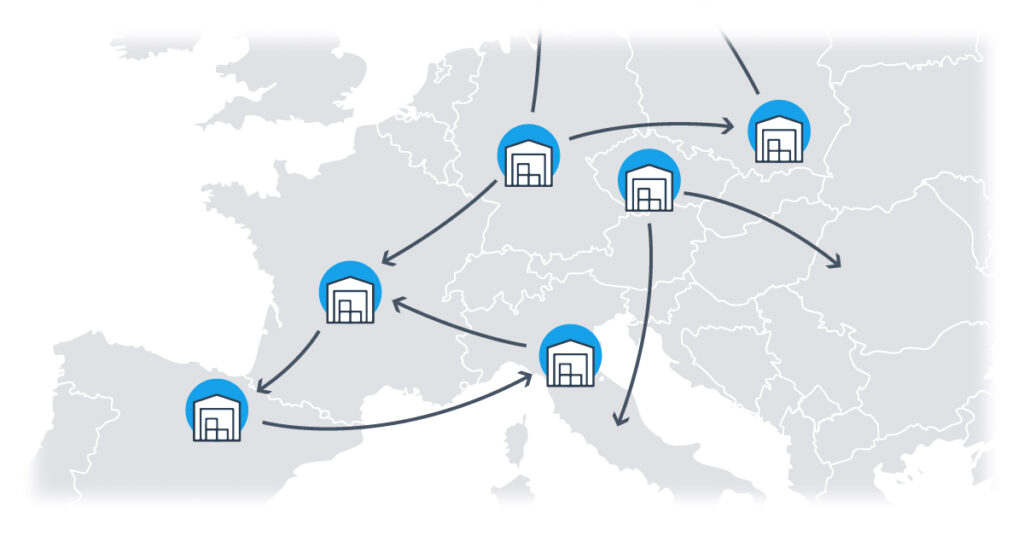- Do you store products and goods in Spain?
- Do you sell products and goods to Spanish customers?
- Do you ship your goods through a fulfillment program?
For more updated information please check here.
Dominik Larcher
Last Updated on 4 May 2022
In these cases, you should register for VAT and then start filing regular VAT returns in Spain.
The hellotax team can help you with all VAT tasks. We support you with the registration, the submission of returns and the communication with the Spanish authorities.
When do I have to submit
VAT returns in Spain?
1. You cross the EU-wide delivery threshold for distance selling
- VAT returns in the countries in which your customers are in are required as soon as the turnover through distance sales exceeds the EU-wide delivery threshold of € 10,000.
- In the event that you sell more, you’ll need to register for VAT and file VAT returns and in all countries you have customers in.
- However, if you participate in the OSS program and only sell and do not store in Spain, this rule does not apply (see below).

Register for VAT in Spain

Submit VAT Return in Spain

2. Your goods are stored in Spain
- Another reason that leads to VAT liability is the storage of goods in a country.
- In this case, you have to register for VAT and also start filing VAT returns.
- This applies not only to independent storage, but also to storage through a fulfillment program or through a fulfillment provider who has warehouses in Spain.


Book a free consultation
Our VAT experts are happy to help you. Book a free consultation today!
3. You are participating an an FBA (Fulfilled-by-Amazon) program
- If you participate in an FBA program, Amazon is authorized to store your goods in a variety of countries, depending on the program.
- For example, under the PAN-EU program, goods are stored in several Western European countries, including Spain, France and Italy.
- If you participate in a program, you must register for VAT in all participating countries, as your goods may be stored there.
- Every sale from a warehouse in Spain to Spanish customers via Amazon must then be declared in Spain and VAT returns would have to be submitted there.

Do you sell on a large scale or do you store goods in Spain?
Then you have to submit VAT returns in Spain. You also need to register for VAT. But don’t worry! Just contact us and we will take care of your VAT registration and returns. This way you can continue to focus on your business in Spain.

Book a free consultation
Our VAT experts are happy to help you. Book a free consultation today!
How to file VAT Returns in Spain
VAT returns in Spain are filed electronically via the spanish Modelo 303 form. In order to submit spanish VAT returns, a special number, the NRC Code, proving prepayment of the VAT payment is required. It is therefore not possible to file returns without prepaying VAT first.
To make a prepayment, a spanish bank account with an authorized bank is necessary. The payment then has to include the VAT number, name, tax period, form submitted and amount to be paid. Once that’s done, the bank will issue the NRC code necessary to file VAT returns. However, the bank account must not necessarily be in the name of the VAT subject.
In general, VAT returns are due on the 20th of each month for the previous tax period, while annual summaries are due on the 30th of January. All companies must file annual VAT returns but some businesses may choose to file quarterly returns instead of monthly ones if their turnover lies below € 6,000,000 in the previous year.
In order to even file VAT returns, a VAT number is required. This can be obtained through registration with the spanish tax authorities. In order to do so, an application including the VAT certificate, an extract from the national trade register, and some other necessary declarations is to be submitted.
In case of late filings, interest fines of 5% per monthly overdue will be added and increased after one year’s delay. Fines for non-compliance are even more severe, running up to 200%. It is therefore important to take care of arising VAT duties in time.
You can simplify both VAT registration and the filing of VAT returns in Spain by using the hellotax VAT automation tool. We help you automate VAT payments, correspond with the authorities and make sure you stay VAT compliant!
The EU-wide delivery threshold and OSS
Until recently, a seller was subject to VAT if he exceeded the country-specific delivery threshold, for example the Spanish of € 35,000, through B2C distance sales. That has changed since July 2021. Since then, exceeding a new EU-wide delivery threshold of € 10,000 has resulted in VAT subjectivity. All sales below this new threshold are taxed at the local VAT rate, the entire tax is paid there and the sales are listed in returns there. If the turnover of B2C distance selling exceeds the new threshold, the goods must be taxed with the respective country-specific VAT rates, registrations for VAT, foreign VAT identification numbers and the submission of VAT returns in other EU countries are necessary.
The threshold no longer applies once a seller has registered for the One-Stop-Shop or OSS. Then the country-specific VAT rates are to be applied from the first sale on. On the other hand, all sales can be listed in a collective return that is submitted to the local tax office. The entire VAT is paid at home and the offices there then distributes the correct amounts to foreign tax authorities. Therefore no VAT identification numbers and filings of returns are necessary in other EU countries as long as goods are not stored abroad.
Example: You are a German distance seller with an annual net turnover of € 11,000 through sales to France, Spain and Poland. If you use the EU-wide threshold, € 1,000 in sales must be taxed at country-specific VAT rates such as Spanish, and registration and filing of returns are mandatory in every country, including Spain. If you use the OSS program, € 11,000 in sales are taxed at foreign VAT rates, but the entire VAT is declared and paid in Germany. However, if you’re using a fulfillment program and goods may be stored in Spain, you will still need to register for VAT in Spain. Then, when goods are sold from a Spanish warehouse to Spanish customers, you will also need to file VAT returns for those sales in Spain.
Need a registration for OSS or VAT in Spain? hellotax can help! We take care of your registration, the filing of returns and the contact with the Spanish authorities.

Hellotax One-Stop-Shop Solution
- Automated identification of B2C sales
- Automated determination of your tax rates
- Handling of OSS registrations and reports
- Quality control for your transactions
When do I need to file VAT Returns in Spain?
VAT Returns in Spain are due on the 20th of the month following the tax period using the Modelo 303 document and annually on the 30th of January using the Modelo 390 form.
| Filing | How often? | Deadline? | Document? |
| VAT Return | Monthly or Quarterly | 30th or 20th of the following month | Modelo 303 in PDF format |
| Yearly | 30th of January | Modelo 390 in PDF format | |
| SII | 4 calendar days after the invoice issuance | Invoice in XML format | |
| EC Listing | Monthly or Quarterly | 20th of the following month | Modelo 349 in PDF format |
| Yearly | 30th of January | Modelo 349 in PDF format | |
| Intrastat | Monthly | 12th of the following month | Intrastat Declaration |
| Local Listings | Yearly | 28th of February | Modelo 347 in PDF format |
| VAT Group Return | Monthly | 30th of the following month | Modelo 322 in PDF format |
Frequently Asked Questions
How often do I need to file VAT Returns in Spain?
In general, you need to file Returns and pre-pay VAT on a monthly basis. Some businesses can choose to file quarterly Returns if their turnover stays below € 6,000,000 a year
What happens if I didn’t file VAT Returns?
The penalties for late filings equal an interest charged on unpaid VAT of 5% monthly. The penalties are increased to up to 20% after one year’s delay. Professionals at hellotax can also help you register for VAT and file Returns retroactively.
How do I register for VAT in Spain?
In order to obtain a VAT ID and start filing VAT Returns in Spain you need to fill out and submit an application to the Spanish tax authorities. Some other documents, such as VAT certificates and an extract from the national trade register also need to be translated and submitted.
What are the different VAT rates in Spain?
In Spain, the standard VAT rate on goods and services is 21%. A reduced rate of 10% or 4% applies for some food items, water supplies, pharmaceutical products, transportation, tourism services, nightlife businesses, construction work, and cultural services.



